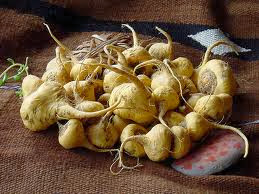Studies show the following fertility benefits:
- Increase in sex hormone production in both men and women.
- Increase in serum FSH and estridiol in women.
- Increase in LH and testosterone in men.
- Improvement in sexual desire in both men and women.
- May normalize ovulation in infertile women when used prior to ovulation.
- Increase in sperm count, motility, and health.
- Decrease in the effects of antisperm antibodies.
- Overall fertility tonic for male and female reproductive system.
- May aid the male body in producing DHEA to treat erectile dysfunction.
Tribulus for Male Fertility
Erectile DysfunctionThe main part of Tribulus, that aids in fertility for men, is a constituent called protodioscin. This constituent improves DHEA levels in the male body. In men with ED, it has been found they have low levels of DHEA. Some studies have shown that protodioscin, extracted from Tribulus, increases natural DHEA levels needed for proper erection. Protodioscin is also the main constituent that is responsible for Tribulus’ aphrodisiac qualities. Increase in sexual desire when using this plant has been reported by both men and women.
Antisperm Antibodies
A study in 1998, performed in Bulgaria, using Tribulus on couples with antisperm antibodies, found a 61% increase in conception. Antisperm antibodies are when the body has an immune response to semen. Antibodies are triggered during the immune response that work to kill off the sperm. High numbers of sperm antibodies can make it difficult for the sperm to reach the egg, and/or fertilize the egg. Antisperm antibodies also may damage sperm that survive, which increases chance of miscarriage. An extract, made into a tablet of Tribulus terrestris was given orally to couples with antisperm antibodies. Both the man and woman were treated. Men received 1 dose, 3 times a day for 60 days. Women received 1 dose, 3 times a day for 7 days, in the beginning of their cycle, for 6 months. The average time it took for couples to conceive was 5.2 months. This shows that consistency of use is very important!
In addition, TCM and Ayurvedic practitioners have found Tribulus to be very effective in improving sperm count, motility, and morphology when combined with dietary and exercise changes.
Tribulus for Female Fertility
Using Tribulus for Female Fertility and Ovulation StimulationOne study performed on 36 women who were not ovulating, showed that that 67% realized normal ovulation after only 2-3 months of consistent use. The women were given 300-400mg a day, from day 5-14 of their menstrual cycle. 6% became pregnant right away.
A rat study using Tribulus, published in Aug. 2011, showed that Tribulus reduced the number of cysts in the ovaries, in female rats with PCOS. High doses of the extract were administered orally. The treatment showed the ovarian cysts to have significantly decreased, and normal ovarian function restored. While this was not a human study, it gives scientists more research to use when considering this herb for treatment of PCOS in humans. Many herbalists find Tribulus is an effective, overall female fertility tonic and ovarian stimulant, making it an excellent choice for women with PCOS. This is especially true for women who are not ovulating due to PCOS.
This herb has been found to be wonderful in aiding women with menstrual irregularities, improving timing of the entire menstrual cycle. Tribulus has also been found to be a nourishing tonic for the female reproductive system as a whole, especially concerning the ovaries.
Tribulus combines well with other herbs. See below for herbal combinations…..
The following herbs have been shown safe and effective when combined with Tribulus.
- Lack of libido: Damiana, Maca
- Male Sexual Dysfunction: Korean Ginseng, Saw Palmetto, Maca or Ashwaganda
- Female Tonic for Reproductive Health: Shatavari, Maca
Capsule: 500mg a day to start, working up to a 1500mg a day as needed.
Tincture: 3-5 mL, 2 times a day.
For Men: Has been shown best to use all month long, 3-6 months.
For Women: Has been shown best to use from day 5-14 of the cycle, not past ovulation. Tribulus should not be used during pregnancy.
Safety of Tribulus Use: Pregnancy Caution
Many studies have been conducted using Tribulus. No adverse effects have been reported in humans, even with long-term use, with the exception of gastrointestinal upset in some people after 6 months of consistent use. Despite safety, there have been some reports by Traditional Chinese Medicine practitioners warning not to use Tribulus during pregnancy. Tribulus is not recommended for use during pregnancy. A woman who is trying to conceive should only use this herb prior to ovulation. Tribulus has been shown to cause or contribute to cholestsis when used during pregnancy. Cholestasis is a liver disease that only happens during pregnancy. In women who develop cholestasis, the normal flow of bile from the gallbladder is affected by very high levels of pregnancy hormones. The gallbladder holds bile from the liver, aiding in the breakdown of fats for digestion. Cholestasis slows this function down, which may cause bile acids to spill into the blood stream.
Some animal studies have shown to cause locomotor disorder known as staggers. While another showed decreased survival rate of offspring when taken during pregnancy. This is why Tribulus should not be used in pregnancy. Discontinue use of Tribulus once you find out you are pregnant, or if you think you may be pregnant.













